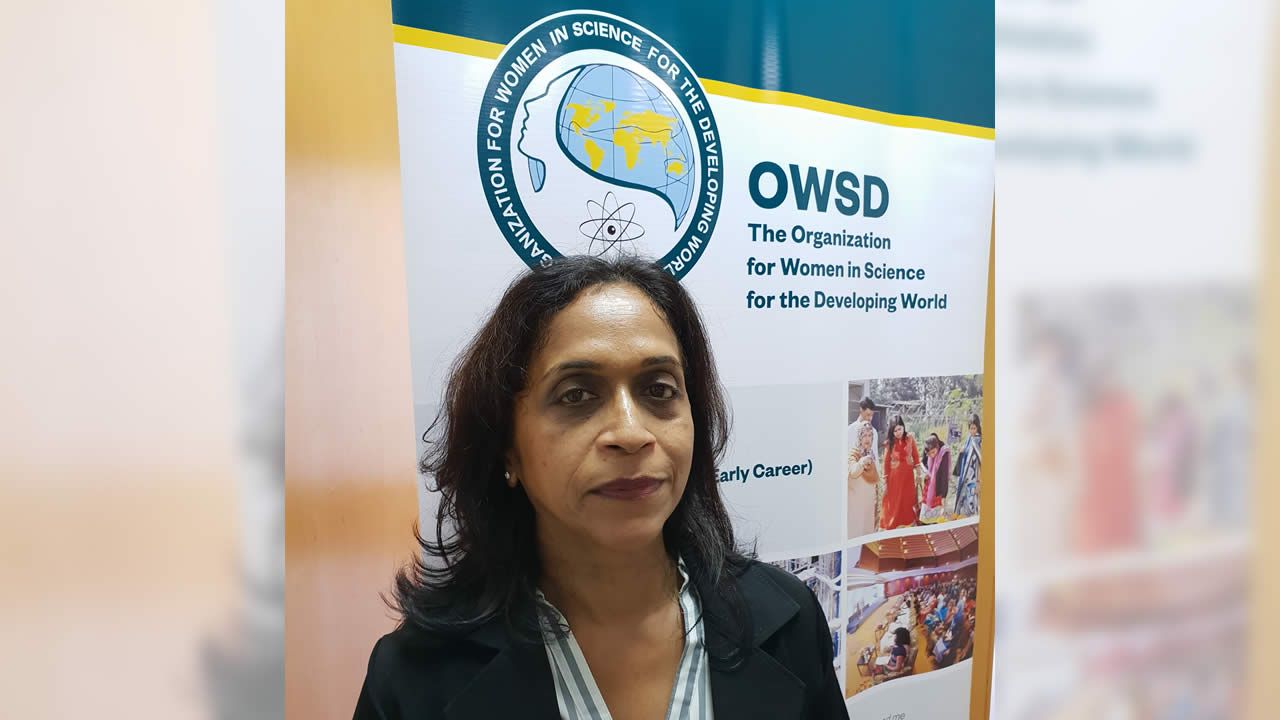
President of the Mauritian Chapter of the Organisation of Women in Science in Developing Countries (OWSD), Dr Devika Saddul has been helping women for years to integrate the science field in Mauritius. One of Mauritius’ prominent scientists, Dr Saddul’s work as the Senior Research Scientist at the Food and Agricultural Research and Extension Institute (FAREI) promotes sustainable agriculture practices in the island. Holder of a Postgraduate Diploma in Applied Science, the Research Scientist is sharing with News on Sunday her views on the contribution of women in science in Mauritius and how to promote STEM among the community at large.
What is the OWSD Mauritius Chapter all about?
The OWSD, which is based in Italy, regroups more than 7,000 women scientists in more than 130 developing countries. The OWSD has taken the engagement to promote science awareness and study among women and girls. The objective is to provide support in career development of women scientists and encourage networking within and between countries to enable scientists assume greater leadership at the workplace and contribute to country development.
Publicité
The OWSD Mauritius Chapter was founded in February 2018 as an initiative to support actions for science promotion among women, youth and the community at large. It is a platform for knowledge and information sharing through guest speaker series, networking and awareness sessions as well as outreach activities in different fields of science. It aims to promote and valorise the contribution of our women scientists in country development and in assuming greater leadership in decision-making processes at their workplace and at both regional and national level. We are inviting more scientists of both gender to join and give their support to the OWSD engagement and to use our platform to disseminate their scientific achievements to the public. We can be contacted on womeninsciencemauritius@gmail.com for further details.
Why, according to you, are fewer girls and women interested in pursuing their higher studies in the STEM field and why is STEM stereotyped?
Science forms the basis of day-to-day activities and challenges which are becoming highly dependent on technology. It is however, noted with much concern on a global level that science does not seem to be attractive as study subjects for students, in particular, girls, at college and university. This is a worldwide phenomenon.
Science is exciting and is what is all around us if we just take the time to stop and marvel at the wonders of science- the nature, the space, the weather, climate change, the food we produce and eat, the constellation, electricity, technological advancement, designs, machines used for manufacture, among others. I think the problem now is that technology has taken over time to ponder over wonders of science.
Unfortunately, it came out during discussions in an informal way with parents, young and mature students and different segments of the population, that science subjects are considered as boring, requiring lengthy duration of studies or post graduate or high level of studies. It also came out that it is difficult to get job employment with just a SC or HSC.
Science used to be associated with laboratories, complex experiments that are out of reach to the common people. While this may be true for some or most types of research, we have to bear in mind that there is also the application side of principles of science or outcomes of scientific research which is linked to the industry and entrepreneurship. For instance, evolution or progress in medicine, technology, disease control, and others. There will always be scope for job prospects and it rests on each one to seek opportunities to figure out which area of science one is compatible or has an affinity with. Even with SC or HSC studies, I believe seeking jobs should not be problematic.
We now talk of gender balance and I think the issue of science being male stereotyped does not really hold in our era as more and more girls are inclined to embark into challenging sectors that used to be more male inclined. It’s all about the mindset, the confidence and leadership one has in addressing the challenges.
I also think there is need to reconsider the approach to teaching science at primary and secondary levels to make it more dynamic, tangible, and exciting."
How can schools, professional organisations and companies work together to empower women entering STEM?
There is need for coordination of educational curriculum with market requirements. It all starts from setting the base, right from the primary school level or pre-primary school. I believe that if a child has not been exposed to the science environment, it is unconceivable how the child can develop a sudden interest for the subject when comes the time for choice of subjects at college. The interest, the affinity and the willingness to learn has to be there. So this has to be worked out how to create this enabling science environment for the children.
Why is it important for women to contribute in the STEM field and what changes can they bring?
In order to contribute to country and community development, to be role models for emerging younger generations and to position themselves into leadership positions. STEM field is not gender exclusive and lots of calls for job or scholarship opportunities encourage female participation.
Once women get into STEM fields what challenges do you see them facing and why?
The greatest challenge for women in the workplace I think is to position themselves in a male dominated world. This is where self-confidence, professional engagement, leadership skills etc come in to be at par with the other gender. Some STEM fields require outdoor and challenging conditions but others are less challenging. This should not be a deterrent for embarking into STEM fields. It’s a question of matching one’s personality and aptitudes to the STEM field.
Do you feel like the socio-political climate we’re currently in, in which many women have started speaking out more, will change issues of gender bias or wage inequality in any way in the STEM field?
I think we are really lucky in Mauritius not to feel this bias or inequality. It may exist at a certain level of the socio economic scale. I think we have gone a long way from what it used to be decades ago and I am confident that each woman has a significant contribution to the society and to country development and that this contribution is being increasingly acknowledged. I also think there is need to reconsider the approach to teaching science at primary and secondary levels to make it more dynamic, tangible, and exciting. There is also need to create links between STEM and the industry for greater career opportunities.
What advice do you have for new female STEM graduates who are in the process of job hunting?
My advice is geared to all graduates irrespective of gender and field of study. It is simple. Throughout the learning process, it is important that they give the best of themselves in whatever they do and whatever subjects or line of study they undertake. Faith, vision, ambition, commitment and the willingness to go out of one’s way to do things without any vested interest or expectation for reward. These are my principles and this is my piece of advice. Commitment and self-satisfaction are the key element to open up one’s professional pathway.

Notre service WhatsApp. Vous êtes témoins d`un événement d`actualité ou d`une scène insolite? Envoyez-nous vos photos ou vidéos sur le 5 259 82 00 !















![[SATIRIQUEMENT VOTRE] Anabelle et l’art de la « punchline-choc »](https://defimedia.info/sites/default/files/styles/square_thumbnail/public/anabelle_ok.jpg?itok=4Z-eqHVn)
![[Satiriquement Vôtre] Pentiah et l’effet « Ice Balling »](https://defimedia.info/sites/default/files/styles/square_thumbnail/public/penthiah_thumb.jpg?itok=dV6Ma2sE)
![[Satiriquement Vôtre] AGG, l’alchimiste des ondes](https://defimedia.info/sites/default/files/styles/square_thumbnail/public/agg.jpg?itok=upwoCqN0)
![[Satiriquement Vôtre] Gungapersad coupe le Réseau des ados](https://defimedia.info/sites/default/files/styles/square_thumbnail/public/mahend_thumb.jpg?itok=ee0qxT4O)
![[Satiriquement Vôtre] Shirin, la dompteuse de l’hémicycle](https://defimedia.info/sites/default/files/styles/square_thumbnail/public/satiriquement_shrin.jpg?itok=W12WttMf)
![[Satiriquement Vôtre] Gunness inaugure... avec zéro effort](https://defimedia.info/sites/default/files/styles/square_thumbnail/public/gunesss_thumb.jpg?itok=tsiVLtDW)
![[Satiriquement Vôtre] Quand le « Messie » devient un mirage](https://defimedia.info/sites/default/files/styles/square_thumbnail/public/messie_thumb.jpg?itok=3dlw2jEh)